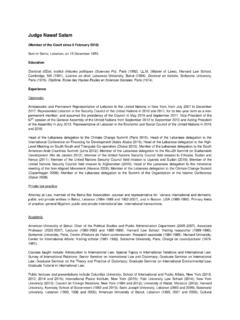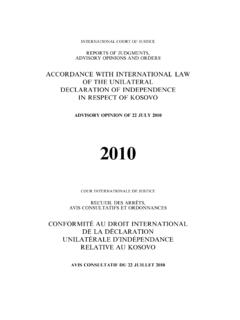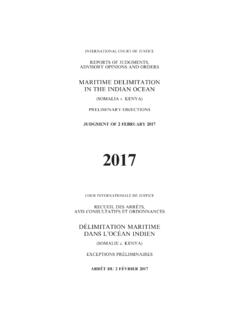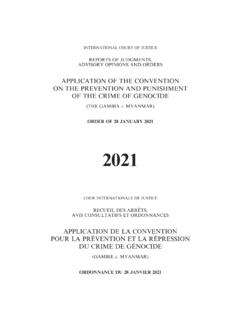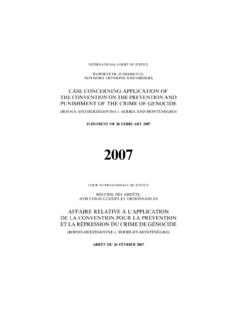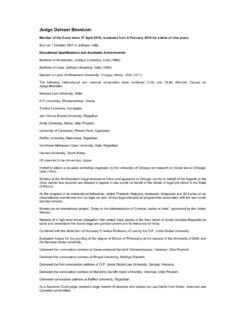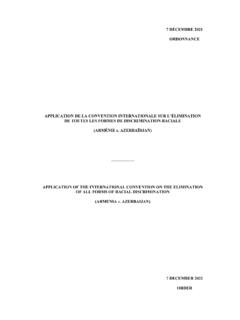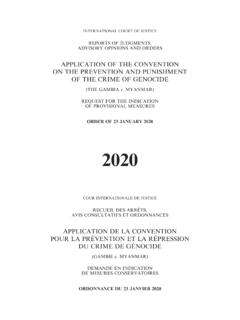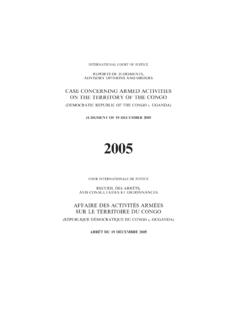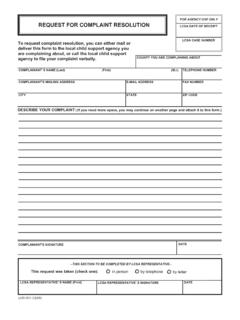Transcription of LEGAL CONSEQUENCES FOR STATES OF THE ADVISORY …
1 INTERNATIONAL COURT OF JUSTICE REPORTS OF JUDGMENTS, ADVISORY OPINIONS AND ORDERS LEGAL CONSEQUENCES FOR STATES OF THE CONTINUED PRESENCE OF SOUTH AFRICA IN NAMIBIA (SOUTH WEST AFRICA) NOTWITHSTANDING SECURITY COUNCIL resolution 276 (1970) ADVISORY OPINION OF 21 JUNE 1971 COUR INTERNATIONALE DE JUSTICE RECUEIL DES ARR TS, AVIS CONSULTATIFS ET ORDONNANCES CONS QUENCES JURIDIQUES POUR LES TATS DE LA PR SENCE CONTINUE DE L'AFRIQUE DU SUD EN NAMIBIE (SUD-OUEST AFRICAIN) NONOBSTANT LA R SOLUTION 276 (1970) DU CONSEIL DE S CURIT AVIS CONSULTATIF DU 21 JUIN 1971 Official citation : LEGAL CONSEQUENCES for STATES of the Contitiued Presence of South Africa in Namibia (South West Africa) notwithstanding Security Council Reso- lution 276 (1970), Adrisory Opinion, Reports 1971, p.
2 16. Mode officiel de citation : Cons quences juridiques pour les Etars de la pr sence continue de l'Afrique du Sud en Namibie (Sud-Ouest africain) nonobstant la r solution 276 (1970) du Cotzseil de s curit , asis consultatiL Recueil 1971, p. 16. Sales number No de vente: 352 1 1971 21 June General List No. 53 INTERNATIONAL COURT OF JUSTICE YEAR 1971 21 June 1971 LEGAL CONSEQUENCES FOR STATES OF THE CONTINUED PRESENCE OF SOUTH AFRICA IN NAMlBIA (SOUTH WEST AFRICA) NOTWITHSTANDING SECURITY COUNCIL resolution 276 (1970) Composition and competence of' the Court-Propriety of the Court's giving the Opinion-Concept of mandates-Characteristics of the League of Nations Mandate for South West Africa-Situation on the dissolution of the League of Nations and the setting-up of the United Nations.
3 Survival of the Mandate and transference of supervision and accountability to the United Nations-Develop- ments in the United Nations prior to the termination of the Mandate-Revoca- bilify of the Mandate-Termination of the Mandate by the General Assembly- Action in the Security Council and effect of'security Council resolutions leading to the request for Opinion-Requests by South Africa to supply further factual information and for the holding of a plebiscite- LEGAL CONSEQUENCES for STATES ADVISORY OPINION Present: Presiden! Sir Muhammad ZAFRULLA KHAN ; Vice-President AMMOUN ; Judges Sir Gerald FITZMAURICE, PADILLA NERVO, FORSTER, GROS, BENGZON, PETR N, LACHS, ONYEAMA, DILLARD, IGNACIO-PINTO, DE CASTRO, MOROZOV, JIMENEZ DE AR CHAGA; Registrar AQUARONE.
4 Concerning the LEGAL CONSEQUENCES for STATES of the continued presence of South Africa in Namibia (South West Africa), notwithstanding Security Council resolution 276 (1970), cornposed as above, gives the following ADVISORY Opinion: 1. The question upon which the ADVISORY opinion of the Court has been asked was laid before the Court by a letter d ted 29 July 1970, filed in the Registry on 10 August, and addressed by the Secretary-General of the United Nations to thePresident of the Court. In his letter the Secretary-General inforrned the Court that, by resolution 284 (1 970) adopted on 29 July 1970, certified true copies of the English and French texts of which were transrnitted with his letter, the Security Council of the United Nations had decided to subrnit to the Court, with the request for an ADVISORY opinion to be transmitted to the Security Council at an early date, the question set out in the resolution , which was in the following terrns.
5 "The Security Council, Reafirming the special responsibility of the United Nations with regard to the territory and the people of Narnibia, Recalling Security Council resolution 276 (1970) on the question of Narnibia, Taking note of the report and recornmendations subrnitted by the Ad Hoc Sub-Cornmittee established in pursuance of Security Council resolution 276 (1 970), Taking further note of the recomrnendation of the Ad Hoc Sub-Committee on the possibility of requesting an ADVISORY opinion from the lnternational Court of Justice, Considering that an ADVISORY opinion from the International Court of Justice would be useful for the Security Council in its further consideration of the question of Narnibia and in furtherance of the objectives the Council is seeking 1.
6 Decides to subrnit in accordance with Article 96 (1) of the Charter, the following question to the International Court of Justice with the request for an ADVISORY opinion which shall be transmitted to the Security Council at an early date: 'What are the LEGAL CONSEQUENCES for STATES of the continued presence of South Africa in Narnibia, notwithstanding Security Council resolu- tion 276 (1970)?' 2. Requests the Secretary-General to transmit the present resolution to the International Court of Justice, in accordance with Article 65 of the Statute of the Court, accompanied by al1 documents likely to throw light upon the question." 2. On 5 August 1970, that is to say, after the despatch of the Secretary- General's letter but before its receipt by the Registry, the English and French texts of resolution 284 (1970) of the Security Council were comrnunicated to the President of the Court by telegram frorn the United Nations Secretariat.
7 The President thereupon decided that the STATES Mernbers of the United Nations were likely to be able to furnish information on the question, in accordance with Article 66, paragraph 2, of the Statute, and by an Order dated 5 August 1970, the President fixed 23 Septernber 1970 as the tirne-limit within which the 18 NAMIBIA ( AFRICA) ( ADVISORY OPINION) Court would be prepared to receive written statements from them. The same day, the Registrar sent to the STATES Men-ibers of the United Nations the special and direct communication provided for in Article 66 of the Statute. 3. The notice of the request for ADVISORY opinion, prescribed by Article 66, paragraph 1, of the Statute, was given by the Registrar to al1 STATES entitled to appear before the Court by letter of 14 August 1970.
8 4. On 21 August 1970, the President decided that in addition to the STATES Members of the United Nations, the non-meinber STATES entitled to appear before the Court were also likely to be able to furnish information on the question. The same day the Registrar sent to those STATES the special and direct communication provided for in Article 66 of the Statute. 5. On 24 August 1970, a letter was received by the Registrar from the Secretary for Foreign Affairs of South Atrica, whereby the Government of South Africa, for the reasons therein set out, requested the extension to 31 January 1971 of the time-limit for the submission of a written statement. The President of the Court, by an Order dated 28 August 1970, extended the time-limit for the submission of written statements to 19 November 1970.
9 6. The Secretary-General of the United Nations, in two instalments, and the following STATES submitted to the Court written statements or letters setting forth their views: Czechoslovakia, Finland, France, Hungary, India, the Netherlands, Nigeria, Pakistan, Poland, South Africa, the United STATES of Arnerica, Yugoslavia. Copies of these communications were transrnitted to al1 STATES entitled to appear before the Court, and to the Secretary-General of the United Nations, and, in pursuance of Articles 44, paragraph 3, and 82, para- graph 1, of the Rules of Court, they were made accessible to the public as frorn 5 February 197 1. 7. The Secretary-General of the United Nations, in pursuance of Article 65, paragraph 2, of the Statute transrnitted to the Court a dossier of documents likely to throw light upon the question, together with an lntroductory Note; these documents were received in the Registry in instalments between 5 Novem- ber and 29 December 1970.
10 8. Before holding public sittings to hear oral statements in accordance with Article 66, paragraph 2, of the Statute, the Court had first to resolve two questions reIating to its composition for the further proceedings. 9. In its written statement, filed on 19 November 1970, the Government of South Africa had taken objection to the participation of three Members of the Court in the proceedings. Its objections were based on staternents made or other participation by the Members concerned, in their former capacity as representatives of their Governments, in United Nations organs which were dealing with matters concerning South West Africa. The Court gave careful consideration to the objections raised by the Government of South Africa, examiningeachcase separately.
